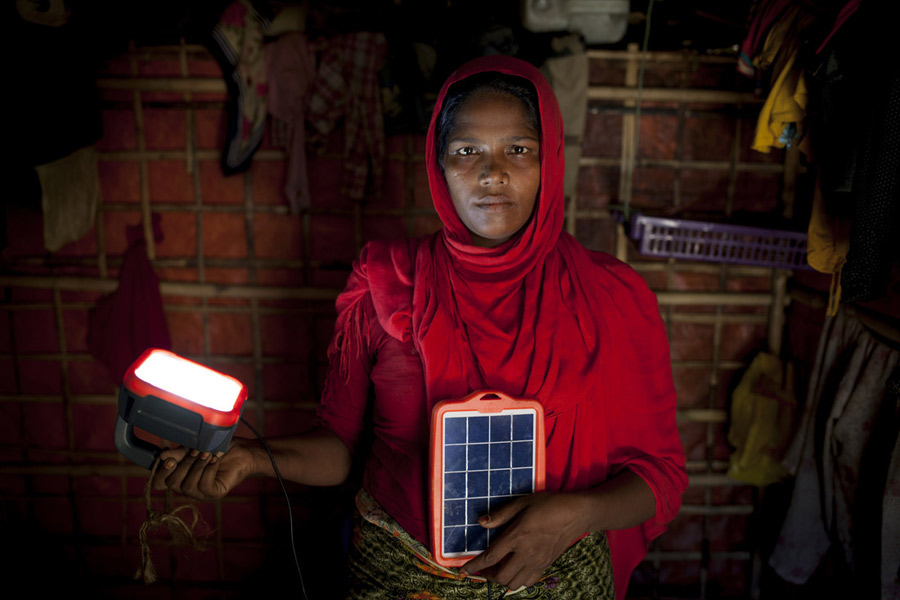
Since August 2017, over 700,000 Rohingya people have fled from Myanmar to Bangladesh seeking safety and lifesaving assistance. While safe from the unimaginable atrocities they suffered in Myanmar, refugees now live in improvised and overcrowded refugee camps such as Cox's Bazar. They’re receiving assistance to meet their basic needs such as food and clean water but life in the camps is complicated, especially for women.
Rohingya women bear the brunt
Despite having crossed the border, many of them alone with their children, Rohingya women and girls face additional challenges: insecurity, violence, very limited mobility or ability to speak up and influence decisions in their communities.
At Oxfam, we are supporting women and girls to proactively overcoming these barriers and contributing to creating an environment where they are listened to and valued. These are some examples of how our gender-based humanitarian programs are making a difference to Rohingya women and girls both in the camps and in hosting communities.
Clothes and tailoring vouchers
As the camp situation forces many women (particularly those from female-headed households) to move outside the ‘home’, it is important to ensure they have access to the clothing that helps them feel safe and dignified. After having distributed multi-purpose cloth to Rohingya women and men, an Oxfam survey revealed many of them could not afford to have abayas (women’s traditional clothing) made.
As a result, Oxfam is providing families with a tailoring voucher to cover the additional costs. We are using local vendors from the host community as part of the scheme.
Solar lighting in the communities

According to an Oxfam’s survey, the lack of privacy and fear of assault contribute greatly to women remaining in their shelters. When asked whether they felt safe walking alone in the camp, 29% of women said ‘no’, compared with 5% of men. Furthermore, over a third of women did not feel they had safe access to a water point, bathing facility or latrines.
Apart from providing portable solar lamps to the families, Oxfam helped design a solar lighting community-based program in Cox’s Bazar that takes into account all the protection measures to reduce women’s feelings of insecurity in the camps.
Women refugees co-design hygiene facilities
The lack of enough latrines in a big overcrowded camp like Cox’s Bazar is a big issue, especially for women, which leads to very poor hygiene practices, lack of privacy and unsafety, increasing the risk of sexual abuse and harassment. Hundreds of incidents of gender-based violence are reported each week.
Apart from building more latrines and hygiene facilities, Oxfam has recently collaborated with two architecture students from Edinburgh University and the University of Newcastle to work with Rohingya refugee women to design toilets and laundry areas that afford more safety and privacy and truly meet their needs.

“Women told us it’s important for them not to feel stared at when entering or leaving the toilets. We want to make the routes into the toilets and washing facilities less obvious and more private so that women feel more comfortable to use these facilities” says Freya Emerson, one of the architects. Some of the pilot designs are already in place.
Helping boost women’s leadership in the camps
From all of Oxfam’s assessments, it is clear that community decision making in the camps rests in the hands of a small number of men. However, women’s traditional roles as carers and providers for families mean they are well placed to advise on appropriate sanitation, water, feeding and healthcare services.
Oxfam is organizing women’s groups and women-friendly spaces in the camps to create more opportunities to share their experiences, support each other, have their voice heard and be able to influence decisions.
Besides, and as part of our humanitarian response, we are working with local organizations and communities to tackle wider issues such as early marriage, gender-based violence and men and women's traditional roles, through women’s groups and musical performances.
Support Rohingya families in Bangladesh
Thanks to the generosity of the public, we’ve provided vital aid like clean water and food to at least 266,000 people and we are planning to reach 300,000. Donate now.